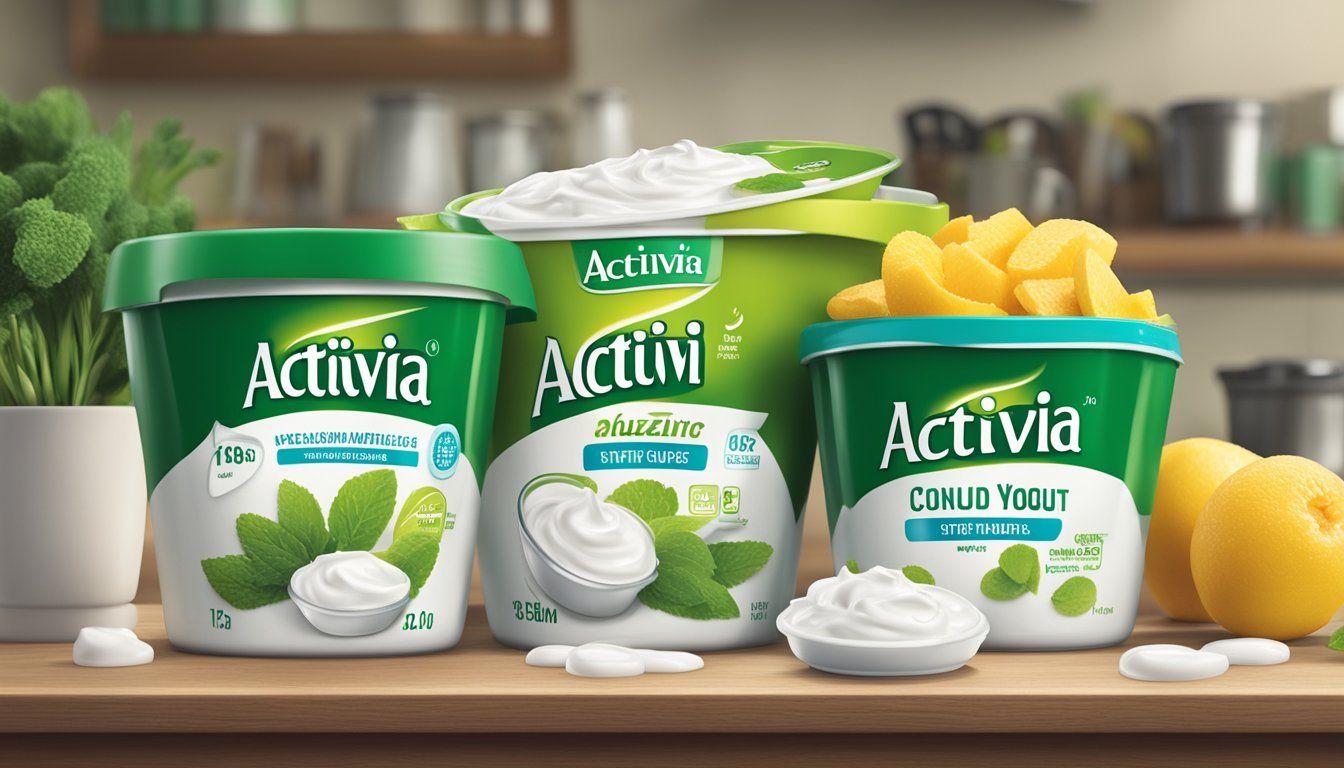How Many Servings of Activia Probiotic Yogurt Per Day Is Too Much?
Understanding Limits and Benefits
Probiotic yogurt, particularly the Activia brand, has a reputation for supporting digestive health due to its live cultures, specifically Bifidobacterium animalis lactis. These beneficial bacteria reside in the yogurt and are known to aid digestive processes. Consuming probiotic yogurt like Activia is often recommended as part of a balanced diet and a healthy lifestyle; it's claimed to help reduce minor digestive discomfort when eaten regularly.
Determining the optimal amount of Activia yogurt to consume daily hinges on individual health goals and dietary requirements. While the yogurt contains healthful elements like live probiotic cultures, it is essential to consider its nutritional content—calories, sugars, fats—and how these fit into one's overall dietary intake. When contemplating the maximum servings one should eat per day, it is important to balance the benefits of probiotics with the need for dietary variety and nutritional moderation.
Health professionals agree that moderation is key in the consumption of probiotic foods. Activia's manufacturer suggests that two servings per day for two weeks can help with minor digestive discomfort. However, exceeding this amount doesn't necessarily increase the benefits and could contribute to excessive calorie intake. Introducing any probiotic or dietary change should ideally be discussed with a healthcare provider to tailor the intake to the individual's health needs and avoid any potential adverse effects.
Understanding Probiotics
Probiotics are live microorganisms that, when administered in adequate amounts, confer a health benefit on the host. This section delves into their role in maintaining health and the specific functions of different probiotic strains.
The Role of Probiotics in Health
Probiotics are often referred to as friendly bacteria and are crucial for a healthy digestive system. They help balance the gut microbiome, which is vital for not only gut health but overall wellness. These live microorganisms can aid in digestion, absorption of nutrients, and bolstering the immune system. The common strains found in yogurt include Lactobacillus bulgaricus and Streptococcus thermophilus. Regular intake of probiotics can lead to improved digestive health and may reduce the frequency of minor digestive discomfort.
Different Strains and Their Functions
The effects of probiotics on health can differ based on their specific strains. Here are a couple of notable ones:
Bifidobacterium animalis lactis DN-173 010: This strain, found in some probiotic yogurts like Activia, is known for its potential to improve bowel regularity and digestive health.
Lactobacillus bulgaricus and Streptococcus thermophilus: These are two separate strains commonly found together in many yogurts. They work symbiotically to ferment milk and can help with lactose digestion, potentially benefiting those who are lactose intolerant.
Each strain contributes uniquely to the gut's microbiome and can influence health differently, emphasizing the complexity and individualized nature of probiotic benefits.
An Overview of Activia
Activia probiotic yogurt is designed to aid in digestive health with specific strains of live bacteria. It is a dairy product commonly consumed to introduce beneficial probiotics to the diet.
Activia Probiotic Yogurt Ingredients
The primary ingredients in Activia probiotic yogurt include milk, cultures such as Streptococcus thermophilus and Lactobacillus bulgaricus, and the probiotic culture Bifidobacterium animalis lactis DN-173 010/CNCM I-2494. This specific strain is known for its ability to survive passage through the gastrointestinal tract. Nutrition-wise, a serving of Activia contains proteins, fats, sugars, and calories essential to a balanced diet.
Protein: Vital for body repair and growth
Fat: Provides energy and supports cell function
Sugar: Adds taste but should be consumed in moderation
Calories: Important for energy, but caloric intake should align with individual dietary needs
The Science Behind Activia
Activia's probiotic formula is backed by research that indicates regular consumption can positively affect digestive health. The Bifidobacterium animalis lactis DN-173 010/CNCM I-2494 in Activia is claimed to help reduce minor digestive discomfort when included as part of a balanced diet and active lifestyle. Sufficient daily intake and consistency are seen as key to experiencing the potential benefits.
Health Benefits of Probiotic Yogurts
Probiotic yogurts, such as Activia, have been linked to a number of health benefits, primarily due to the presence of live bacteria known as probiotics. These live cultures are known to aid in digestion and bolster the immune system.
Digestive Wellness and Probiotics
Probiotics are live microorganisms that, when consumed in adequate amounts, bestow health benefits on the host, particularly by improving or restoring the gut flora. Activia, a well-known brand of probiotic yogurt, is reputed to contain Bifidobacterium animalis lactis DN-173 010/CNCM I-2494, a strain of bacteria with demonstrated benefits for digestive health. Regular consumption of probiotic yogurt can help maintain the balance of good bacteria in the digestive system, aiding in various features of digestive wellness, such as:
Enhancing nutrient absorption
Alleviating minor digestive discomforts
Contributing to regular bowel movements
This form of yogurt often contains essential vitamins and minerals like calcium and potassium, which are vital for bone health and regulating body fluids, respectively.
Strengthening the Immune Response
The immune system is intricately linked with the gastrointestinal tract. Probiotics in yogurts interact with gut-associated lymphoid tissue (GALT) to help modulate the immune response. This interaction can lead to:
Enhanced immunity, by stimulating the production of antibodies
A potential reduction in the incidence or duration of infections
By fostering a healthy community of probiotics in the gut, probiotic yogurts contribute to reinforcing the body's natural defenses.
Daily Consumption Guidelines
When considering the appropriate intake of Activia probiotic yogurt, consumers should follow the recommended serving sizes and understand how to incorporate these servings into a balanced diet.
Recommended Serving Sizes
For adults, it's generally recommended to consume up to two servings of Activia each day to potentially aid in digestive health. Each serving of Activia yogurt is typically about 4 ounces (113 grams). However, one should consider the daily recommended dairy intake, which is three cups for individuals over nine years of age.
It's important for consumers to read labels for specific portion sizes, as sizes can vary between different yogurt varieties. For children over one year, a pediatrician may advise a smaller serving size, such as two ounces per day.
Balancing Diet with Probiotic Intake
A balanced diet is key when incorporating Activia or other probiotic yogurts. Consumers should be mindful of their overall consumption of dairy products, ensuring it's part of a diet that includes a variety of nutrients.
Moderation is crucial to avoid overconsumption which can lead to excess calorie intake and potential weight gain. Consumers should opt for low-fat or fat-free versions when concerned about calorie and fat content. Always consider the content of fiber, carbs, and other nutritional elements, and how they fit into daily dietary needs.
Consulting with a doctor or dietitian is advised for personalized recommendations, especially for those with specific dietary needs or health conditions. They can provide guidance on the appropriate dosage of probiotic yogurt in relation to an individual’s total daily consumption of food and nutrients.
Potential Side Effects
While Activia probiotic yogurt can be beneficial for digestive health, individuals may experience side effects if they consume too much. Understanding the signs of overconsumption and considering individual lactose tolerance is crucial.
Recognizing Overconsumption Symptoms
Probiotic-rich Activia, when consumed in moderation, supports digestive wellness. However, excessive intake can lead to gastrointestinal issues. Symptoms of overconsumption include:
Bloating: An uncomfortable fullness in the abdomen.
Gas: Excessive production can be embarrassing and uncomfortable.
Diarrhea: Frequent, loose stools that may occur with overconsumption.
Abdominal Discomfort: General pain or discomfort in the stomach area.
These symptoms often signify that the digestive system is overwhelmed with probiotics and is struggling to maintain balance.
Lactose Intolerance and Probiotics
Lactose Intolerance is a common condition where the body can't easily digest lactose, a sugar found in dairy products like yogurt. Activia contains lactose, and therefore must be consumed with caution by those with this intolerance. Symptoms may include:
Discomfort: Feelings of pain or unease in the digestive tract.
Upset Stomach: A general term for stomach disturbances following lactose consumption.
Digestive Discomfort: General term encompassing bloating, gas, and abdominal pain.
For individuals with lactose intolerance, even the standard recommended servings of Activia could provoke symptoms. They may need to seek lactose-free probiotic alternatives.
Safety Considerations and Interactions
When incorporating Activia probiotic yogurt into a daily diet, one should consider potential interactions with medications and the importance of consulting healthcare professionals, especially for those with specific health conditions or on antibiotics.
Consulting Healthcare Professionals
Individuals considering Activia probiotic yogurt, particularly children, those with weakened immune systems, or those suffering from conditions like irritable bowel syndrome (IBS), should first consult with a doctor. Healthcare professionals can provide guidance on appropriate serving sizes and potential effects on existing health issues. A healthcare provider should also be informed if an allergic reaction occurs, as it might indicate sensitivity to ingredients in the yogurt.
Probiotics with Medications and Antibiotics
Probiotics like Activia may interact with certain medications, and their efficacy can be compromised when taken concurrently with antibiotics. Antibiotics may disrupt the balance of beneficial bacteria in the gut, potentially reducing the positive effects of probiotics. Therefore, individuals should discuss optimal timing for probiotic consumption with respect to their medication schedules. Additionally, those on immune-suppressive therapy should exercise caution as probiotics could affect their immune system responses. It's usually recommended to separate the intake of probiotics and antibiotics by at least two hours.
Healthcare professionals might advise incorporating probiotics as supplements to aid in restoring the gut's microbial balance post-antibiotic treatment. However, the precise interaction and compatibility with other medications should always be managed by a qualified individual.
Choosing Probiotic Products
When selecting probiotic products, consumers should consider the type of probiotics offered, their potential health benefits, and dietary preferences or restrictions.
Activia vs. Other Probiotic Foods
Activia yogurt is known for its probiotic culture Bifidobacterium animalis lactis DN-173 010/CNCM I-2494, which is designed to aid in digestion when consumed twice daily. In contrast, other probiotic foods may contain different strains of bacteria. These can range from Lactobacillus in fermented milk products to the variety of cultures found in fermented foods like kimchi, sauerkraut, and kefir. One needs to consider the specific strains and the quantity of live cultures when comparing probiotic foods.
Probiotic Profile:
Activia: Contains Bifidobacterium animalis lactis
Fermented Foods: Can include various lactobacilli and bifidobacteria
Fermented Milk: Often contains strains like Lactobacillus bulgaricus and Streptococcus thermophilus
Yogurt Alternatives for Probiotic Benefits
For those seeking probiotic benefits without consuming yogurt, a variety of alternatives exist. These include probiotic supplements, which can provide a focused dose of specific bacterial strains, and other cultured dairy products like kefir or cultured cheeses. Many of these products are also kosher-certified, ensuring they adhere to specific dietary laws. Additionally, incorporating prebiotics into the diet can support the growth of beneficial bacteria. Prebiotics are found in foods such as bananas, onions, and garlic.
Non-Yogurt Probiotic Products:
Supplements: Delivers specific strains of probiotics
Kefir: A fermented milk drink with diverse cultures
Cheese: Some cheeses are cultured and contain live bacteria
A healthy lifestyle includes a balanced approach to consuming probiotic and prebiotic foods or supplements. The key is to choose products that align with one's health goals and dietary needs.








